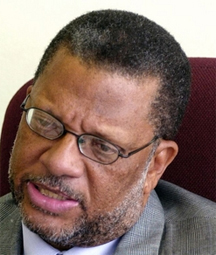KINGSTON, Jamaica, (Reuters) – Peter Phillips, who held several Cabinet posts in previous administrations, was sworn in yesterday as Jamaica’s minister of finance and planning and will lead the economically struggling island’s negotiations with the International Monetary Fund.

Phillips, 62, was the People’s National Party (PNP) finance spokesman and campaign director and served in previous administrations as minister of national security, transport minister and health minister.
He was among 19 Cabinet members sworn in as newly elected Prime Minister Portia Simpson Miller made her appointments. The PNP won a landslide victory in general elections last week, ousting the slightly more conservative Jamaica Labour Party (JLP) that had ruled since 2007.
The election turned largely on discontent with the Caribbean nation’s ailing economy and massive debt. Jamaica’s unemployment rate rose to about 13 percent, from just under 10 percent in 2007 when the JLP won power in 2007, and its public debt totals more than 120 percent of gross domestic product.
Simpson Miller said during her inauguration Thursday that the new government’s top priorities would be creating jobs, restoring trust in government and reassuring financial markets that the administration would be fiscally responsible.
She acknowledged it would be “an awesome task.”
“We will pursue a tight fiscal policy, reduce our debt to GDP ratio, maintain the key macro economic fundamentals, and be very careful and prudent in our debt management,” Simpson Miller said.
“My administration will work tirelessly. But while we try to balance the book, we balance people’s lives as well,” she said.
Phillips’ first task will be to seek discussions with the IMF to negotiate a new agreement when a current $1.27 billion bailout agreement expires in May.
Jamaica has little room to maneuver in its budget.
Almost 60 percent of its current-year spending goes to debt payment and debt service, while another 30 percent goes to government payrolls.





